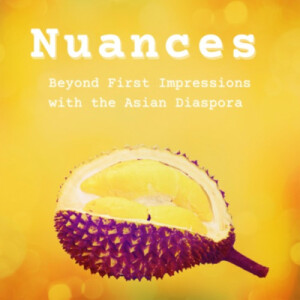
Sunday Jun 26, 2022
S1 E09: Sally on working with young people, Asian representation in media, mental health, gender roles & bisexuality.
This week, Sally shares her experiences growing up as a Taiwanese-Coquitlamite-Torontonian and her thoughts on diversity and inclusivity in higher education.
TERMS
Resident student leader
Orientalism
Colonialism
Microaggression
Spiritual pluralism
Islamophobia
MENTIONED IN THE SHOW:
The Left Hand of Darkness - Ursula K. Le Guin
TAKEAWAYS:
- Sally grew up in a diverse city with other Asian-Canadian peers, which helped her feel less alone in her experiences. This is why diversity and representation matter.
- Even if you speak the language of your home country, there are still things that can get lost in translation. Language evolves, and members of Asian diaspora communities don’t always know the latest slang.
- One of the trickiest things to navigate as an Asian diaspora person is balancing Eastern and Western ideals. For example, choosing an area of study purely based on your own interests and dreams, rather than a career your family wants, is a more Western mindset, and it can be difficult to explain these decisions to family members.
- Being vocal about social issues is something that a lot of Asian diaspora members have had to grow into. It wasn’t ingrained in us to be vocal about these things; we were taught not to make waves and not to rock the boat. But now, more than ever, it’s important that we use our voices to talk about things that matter. Last week, Edmond talked about the hashtag #PrideInEveryColor and how he is creating a safe community to share our voices. We encourage you to find them on IG and TikTok and interact with their content.
- Racism is not just an individual behavior; it is a complex system that encourages/facilitates racist behaviors or policies.
- As Asian diaspora members, while it’s important to help do the work of dismantling colonialist, oppressive systems, it’s also important that we give ourselves permission to rest. We do not need to reduce our identity to only doing this work.
- Sometimes it is a tricky balance to navigate being feminist and being Asian, and being LGBTQIA+ and being Asian. There are Orientalism tropes and sexist mindsets to get past. Gender norms are often more binary in Chinese culture, whereas in Western countries, diverse expressions of gender identity are more common and accepted, but Asian representation tends to be lacking.
- Not all Asian media representation is good. A lot of it is based in stereotypes, and not well-researched. Their Asian identity is often a punchline or their entire personality. It’s important to push for meaningful representation that portrays Asian characters as complex human beings, rather than tropes.
- Mental health is still a taboo subject in many Asian families. If someone is struggling but refuses to get help, setting boundaries on what behaviors would be deemed serious enough to call for professional help can be useful for both parties.
Instagram | Blog | LinkedIn | Twitter
Hosts: Ariadne Mila & Sherry-Lynn Lee
--- Support this podcast: https://podcasters.spotify.com/pod/show/nuancespod/supportVersion: 20241125
Comments (0)
To leave or reply to comments, please download free Podbean or
No Comments
To leave or reply to comments,
please download free Podbean App.